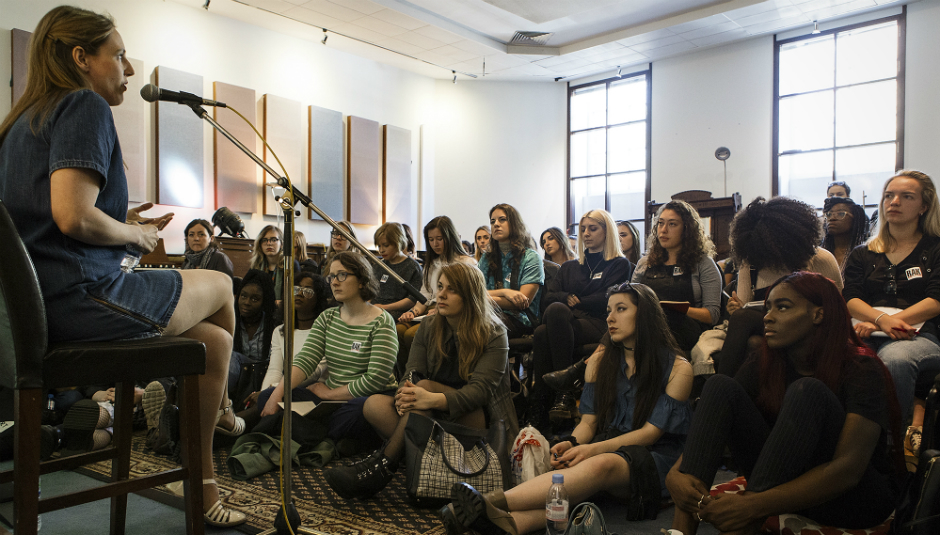Sadly, much like any other industry that doesn’t involve caring for or serving someone, the music business is woefully short on women folk amongst its ranks. There is no doubt countless socio-political, cultural, and oh-for-fuck-sake-why-haven’t-you-been-consigned-to-ancient-history good old-fashioned misogynistic reasons for this glaring shortfall. Even so, the facts still come as a bit of a shock. It’s pretty easy to dump the "its 2017 man, equality rules" type complacency when confronted with the statistic that 32.2% of music industry jobs are filled by female workers compared to 67.8% of men. Delve further into the breakdown of labour within those figures and the scene gets even more depressing.
The Guardian reported this year that women make up 60% of interns and 59% of entry level roles within the music business. So, even if, as a woman, you’re ‘lucky’ enough to crack the industry you’ll likely find yourself one the lower end of the pay scale making tea. Hurrah! Progress!
But, hang fire on reaching for the Smiths records just yet. Amongst all these dispiriting statistics lies an increasing push from a number of businesses, individuals, and organisations to reverse the trend. For instance, PRS Foundation have a fund called Women Make Music, which supports women songwriters and composers at different stages in their career. And DiS was recently invited to attend the second Girls Music Day, which was launched last year by ticketing app DICE.
The two-day event took place at RAK studios and was designed to give young women aged between 16 and 24 a real insight into different aspects of the music industry through a series of guest speakers, a jobs fair, and a series of workshops on engineering and production.
The event wisely focused less on the difficulties of being a woman in the music industry, and more on letting the young women glean advice from those with experience. And what a vast array of experience the audience were treated to; speakers included 4AD’s Head of Press Annette Lee, singer-songwriter Rae Morris, Kobalt Product Manger Helen Barrass, and Music Programmer for Latitude Festival Lucy Wood.
Given the impressive curriculum vitae’s on display, it was somewhat surprising that many of the speakers confessed to being ever-so-slightly nervous. You wouldn’t readily expect a group of women at the top of their professional games to be even slightly shaken by a room full of young millennials. However, the experience led Annette Lee to exclaim, “Suddenly I’m in a room full of girls and I’m like ‘this is terrifying!'” But, as the day wore on I came to understand why. Firstly, young people really are terrifying - as in terrifyingly confident - certainly to those in, around, above, and beyond their 30s. And, sadly it’s is perhaps also indicative of a generation of women that, however successful, still struggle with confidence in a male dominated environment.
Kobalt’s Helen Barrass spoke candidly of exactly this issue on the day. Nerves duly settled, she explained: “I feel like that [lack of confidence] held me back in some ways, as I’ve always worked in companies where there’s a lot of men and no senior women. And that can be quite hard as you don't really have a role model, someone who understands. Feeling quite unconfident at times - I don't think some of my male managers understood that. I found it quite difficult at points.”
Helen is a member of a network of women in the industry called shesaid.so, and made their Alternate Power 100 List last year. She impressed the importance of seeking out other women in the industry for support: “It’s important to bond and communicate with other women in other companies, and stick together and talk to men as well about the kind of issues that arise at times.”
It was a sentiment that Rae Morris echoed. Having signed to Atlanta Records in 2007, and released her debut record Unguarded in 2015 she found herself almost entirely surrounded by men. “It’s quite amazing that you always remember the two ladies you’ve met on tour - it shouldn’t be like that at all.”
“I had a female drummer, and someone actually shouted out during the set, ‘female drummer!’ And it’s like ‘yes.’ It shouldn’t be that strange.”
Much like Helen, she talked about the importance of finding a female ally. “Just having a girl around is so helpful. Anywhere you can get a girl in your band, or do a full girl band. I really did find it so wonderful to have a friend around.”
Fellow singer-songwriter Rosie Lowe had an alternative take on the problem of confidence. She released her debut record Control in 2016 having signed to the Polydor supported Wolf Tone label, and she believes it’s important to stick to your guns and push for what you want. “I often think to myself ‘What would a man do?’ It’s a question I ask myself a lot, ‘What would a dude do? They’ve just got this inherent confidence. They’d say, ‘Nah I’m not feeling it,’ and I wouldn’t be offended by that. Honesty is key, transparency is key.”
As much as the day, and the speakers, were sensitive to the ingrained problems and difficulties that come with being a woman in the music industry, it’s was no love-in. All the women gave solid advice and doled out hard truths that are integral to succeeding in what is a notoriously competitive and difficult business to crack.
Senior Marketing Manager at Polydor records Karen Dagg gave a few insider tips on interviews. “The number one question you’re going to get asked is what type of music are you into, and it’s fascinating the number of people who answer, ‘a bit of everything’ or ‘eclectic,’ and they don’t actually want to champion anything. I’m not going to judge you, like, ‘what!? Right out, go.’ It’s your absolute calling card to talk about the music that inspires you, and what you're passionate about.”
Equally, Katie Ray, Head of Digital at Method Music, warns of her stalking tendencies prior to interviewing a candidate, and the importance and pitfalls of social media: “If you start posting Sam Smith stuff from the day you’ve applied I’ll know, I can tell a lot about you. You’ve got to market yourself. I do stalk people.”
Annette Lee, like many who spoke that day, told of the roundabout way she reached her career ambitions, and that despite the glamorous image the industry has, as with most things, the bottom line is hard graft: “I started off a blog and started writing about music, just to demonstrate that I really cared about it. It worked and I got promoted, and then I worked my way up and I’m now head of press.”
As neat and concise as that may sound Annette explains that it all took 12 long years, and a stint as a receptionist, so... “Yes it worked, it's not an overnight success, but overnight successes don't exist! You have to be prepared to put in the legwork, and if you’re not this isn’t the industry for you.”
One thing that both Annette and Lucy agree on is the importance of being a generally agreeable human being. As simple as it might sound, the fundamental value of being decent is always good counsel, as Annette said. “Just be nice, it’s a really small industry, and if you make a bad impression on someone they are not going to go out of their way to help you.”
Equally, Lucy attributes, at least some of her success to her sunny demeanour. “This is going to sound really twee, but I’m really nice. And people like a little ray of sunshine,” which is followed by the swift correction, “I’m not an idiotic ray of sunshine.”
It’s not a sentiment you’d imagine a group of men to be discussing at such an event - "Hey fellas, just be really lovely to each other, yeah?" But sweeping generalisations aside, Lucy does speak of the differences in behaviour between men and women that became apparent to her whilst studying for her Sociology MA. Her area of focus was public behaviour at gigs, and she discovered a marked difference in conduct between genders: essentially men nod, and women dance.
She explained: “Men have a lot to gain by showing that they are having a mental, cerebral experience at a gig. In this field - this is maybe slightly too negative for a day of this sort - women don’t have anything to gain by being recognised at gigs; they’re tokenised, or men are like ‘Wow, you’re here! How cute, I didn’t know you liked music too.’ So you might as well dance and have a good time because your status isn’t going to go up by nodding.”
It’s a theory that’s simultaneously depressing and pleasing. Speaking for myself, I’d rather embarrass myself via erratically flailing limbs whilst having the best time ever than look like the nodding dog off the Churchill advert. Personal preferences aside, it gets to the root of the problem; that what are traditionally thought of as female behaviours and traits are deemed to be somehow less serious, and less intelligent.
Looking around a room of dazzling young women armed with increased confidence, a no doubt deepened sense of support, and a barrow load of sage advice feels like a very positive step towards changing that. With a gang like this and events like DICE's Girl's Music Day the future doesn't look too shabby - short on aresholes, and full of dancing.
More information about DICE's Girls Music Day can be found on their official website.
Photo credit: Chris Almeida for DICE Girls Music Day























